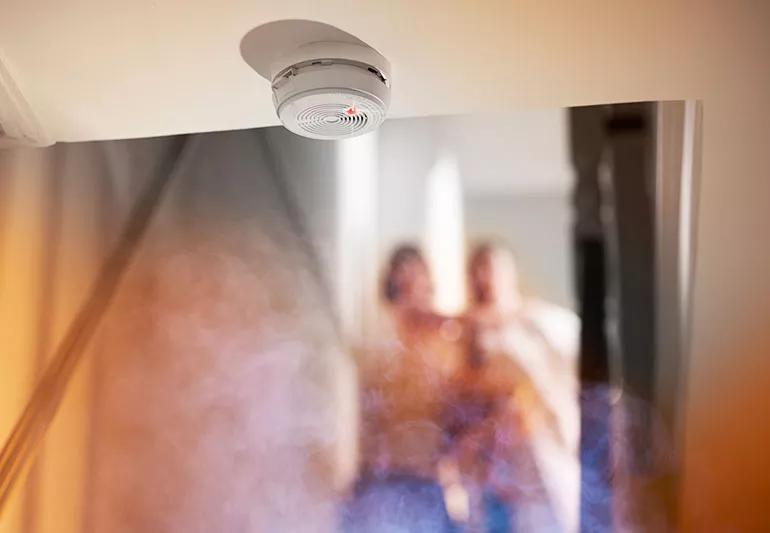Most post-fire deaths occur because of smoke inhalation

Image content: This image is available to view online.
View image online (https://assets.clevelandclinic.org/transform/39db20c3-7f89-4444-827c-71fc6eb1ca99/HouseFires-609831034-770x533-1_jpg)
Closeup of a smoke swirling up to a smoke detector, with a couple visible in the background
There are more than 1 million house fires in the United States each year and more than 3,000 people will die each year as a result of fires. But the cause of death in a fire usually is not from severe burns. More often than not, deaths in house fires are a result of smoke inhalation (smoke poisoning).
Advertisement
Cleveland Clinic is a non-profit academic medical center. Advertising on our site helps support our mission. We do not endorse non-Cleveland Clinic products or services. Policy
“While the danger of being burned by a fire is evident, many people are unaware of the dangers of smoke inhalation,” says emergency department physician Baruch Fertel, MD.
Often, the smoke in a house fire overcomes people so quickly that they can’t make it to an otherwise accessible exit, the National Fire Protection Association (NFPA) says.
When people think of death by fire, they typically imagine fire breaking out in a place that is crowded with strangers, like a movie theater or restaurant. In reality, the people who die in fires typically in their own homes and vehicles, the NFPA says.
Although homes fires and deaths have declined since 1977, four out of five fire-related deaths among non-firefighters occur in the home.
“When you inhale smoke from a fire, you’re really inhaling a combination of a bunch of toxic products,” Dr. Fertel says. “The ‘smoke’ is mostly carbon monoxide, but also contains cyanide. Many homes contain a lot of synthetic materials such as rubber, plastic or foam. When those materials burn, they can cause house fire cyanide poisoning.”
Cyanide is a poisonous chemical gas that prevents your body from absorbing and using oxygen.
Inhaling burnt plastic and the toxic combustion of materials in the home also impairs respiration and can cause suffocation, Dr. Fertel adds. Oxygen deprivation, even for short periods, can cause irreversible harm.
Advertisement
People who have sustained carbon monoxide poisoning have a risk for more health risks after a house fire, like cognitive delays or other neurological issues, he adds.
While many factors can be responsible for a house fire, one of the most common causes during cold weather months is a space heater.
If you must use a space heater, Dr. Fertel recommends getting a new one that is equipped with safety features and always make sure it’s operated in an area with ventilation.
“If it’s something that burns, such as a combustion heater, it’s really important to make sure that the area is vented,” Dr. Fertel says. “One good safety feature is a tip-over feature that makes sure that the device shuts off if it tips over.”
Electrical fires, cooking fires and candles are also common causes of house fires.
“It is never safe to enter a burning home, whether it be a small house fire or a home engulfed in flames, even if you think you are away from flames,” Dr. Fertel says.
“It only takes a short period to be overcome by smoke inhalation,” he warns.
If you notice flames or fire in or around your home, call 911 immediately. Let the professionals do their job.
To prevent house fires in the future:
Advertisement

Sign up for our Health Essentials emails for expert guidance on nutrition, fitness, sleep, skin care and more.
Learn more about our editorial process.
Advertisement
Open the windows, keep a clean house and consider putting in preventive features like carbon monoxide detectors
Though they release a small amount of VOCs into the air, there isn’t enough strong evidence to say they’re dangerous to your health
There’s no safe way to find, handle, repair or remove asbestos yourself — it’s always a job for a professional
Investing in a humidifier and keeping yourself hydrated can help you stay healthy despite dry air
Lightning can strike indoors, even with plastic plumbing — and that includes in the shower
6 tips for protecting your lungs while you work
Benefits may go beyond breathing
The best ways to keep your home’s comfiest places germ-free
Prioritize your health by managing stress, strengthening your social connections and getting quality sleep
Bolsters, blankets, pillows and blocks can offer extra support, stability and comfort
Allergies, postnasal drip, asthma or reflux could be to blame for a cough that won’t quit